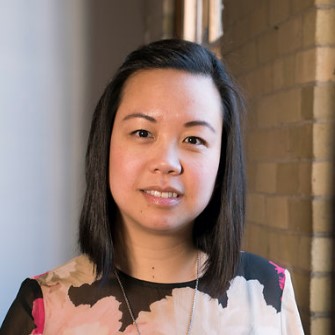October 2022

Michelle Yeung
Michelle Yeung, Managing Director at the School of Toronto Dance Theatre, joined Toronto Arts Foundation as Creative Champions Network Lead in June 2022.
The program offers workshops, resources and networking opportunities for arts board volunteers and arts leaders to learn more about governance; including roles, responsibilities and effective working models.
Michelle, having served on many arts boards including Mass Culture, Prologue Performing Arts and Cahoots Theatre Company, and as an arts leader herself, is bringing her knowledge to inform and organize a new round of topics and workshop sessions. During her previous tenure at Toronto Arts Foundation, Michelle worked closely with Jini Stolk to develop Creative Champions Network (CCN) from conception to reality.
We spoke with Michelle about board work, the program and what participants can expect.
1. Describe a good, functioning board. Why are arts boards so vital to the health of an organization?
A good, functioning board should be balanced with expertise and represent what the organization needs at that moment in time. It should take the lead from the organization, know when to step in and step out, and should always be evolving. It should support its leaders, and themselves, to lead responsibly and sustainably. A good, functioning board should exist in collaboration with the organization.
2. What can go wrong with arts boards? What are the risks?
The biggest thing that can go wrong with arts boards is not having the proper processes or plan to recruit, nominate and onboard new board volunteers. Board succession is frequently dealt with passively. It isn’t one person’s fault - sometimes there are just other priorities on a day-to-day. Aside from not meeting board standards, the biggest risk is having an ineffective board. An ineffective board can add more strain to an organization, stretch its resources, and affect an organization’s culture and its mission-driven work negatively.
3. You supported Jini Stolk in the creation of Creative Champions Network in 2015. What was the need then? Has it changed?
The need in 2015 was to galvanize a group of senior volunteers who were in isolation of each other, to bring them together, to help board members be more informed and engaged and be better volunteers. The learning, sharing and networking is still needed but now we need to take it to the next level. The arts sector continuously experiences resource scarcity and board members play a pivotal role in balancing organizational deficits. Our focus now is to bring this learning to life for board members and leaders, and into action, together.
4. What challenges do arts boards experience, and what can board members gain from CCN?
The biggest challenge arts boards experience is their passive function in balancing many priorities. The arts is a unique and complex sector. It is difficult to engage through economic, artistic, individual and collective priorities with a volunteer board but it is possible. The CCN will aim to provide some insights and tools to overcome these challenges.
5. What kind of discussion topics are you thinking about for the future?
Upcoming topics will be informed by the many similar questions I have received over the past two years. This includes the partnership between board and arts leaders, board succession, leadership succession, financial oversight and organizational health, and reimagining governance. These topics will be structured around how an organization, both leaders and board members, can work collectively together to move their organization forward.
6. What are your goals for the program over the next two years? How will CCN evolve under your leadership? What can someone new to the program expect?
The goal over the next two years is to provide support to arts organizations where it is most needed and to address some of the immediate concerns of the sector for small to mid-sized arts organizations. Partnerships will be very important in our programming and new voices will be brought forward to challenge our assumptions about governance and the complexity of these relationships.
For those who are joining for the first time as well as returning members, expect dialogue, learning and sharing, and putting these valuable conversations into action. Together we will build better arts boards and stronger organizations through our recovery from the pandemic.